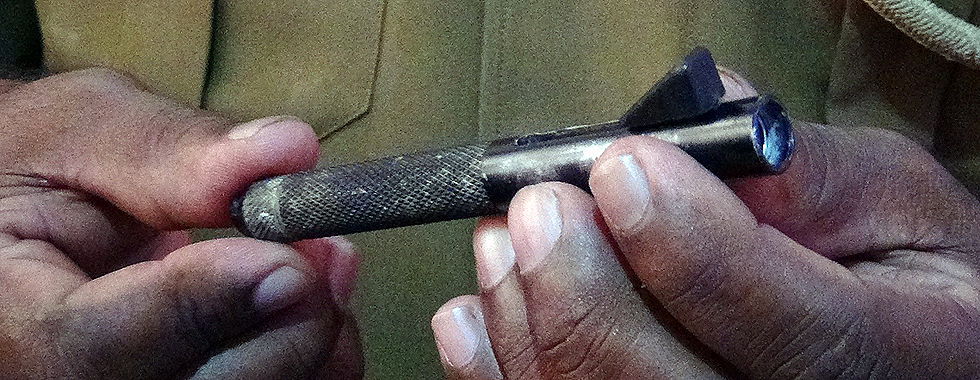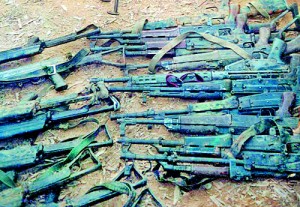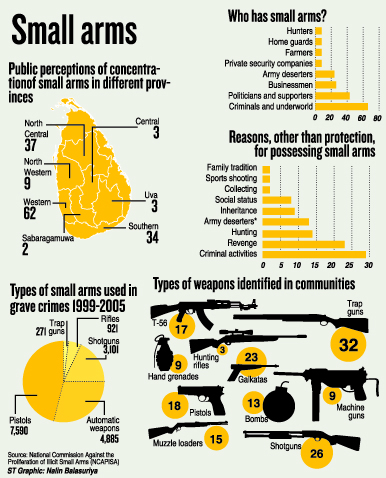News
Have-gun-will-kill homicide spree highlights illicit firearm proliferation
A hike in gun crimes including homicides, attempted murders and robberies using weapons ranging from 9 mm pistols to T-56 assault rifles, has highlighted the threat posed by firearms getting into the hands of criminals; but the Government’s response to the problem has been slow, with little follow-up action on pledges made to various UN bodies to deal with the proliferation of small arms and light weapons, particularly in a postwar scenario.

Seized weapons inculding a pen pistol
In May and June alone, there were three high profile murders committed using firearms, including the murder of Peliyagoda UC UPFA member Chamila Sandaruwan, Police Constable Chandana Sampath who was shot dead at Mukalana on the Kurunegala-Dambulla Road, after a failed abduction attempt, and more recently, the murder at Tangalle of a bus conductor named Prabath Chandana, who is belie ved to be a close confidante of Amila Niroshan alias Army Amila, a suspect in several criminal cases, who was shot and injured two weeks earlier near the Tangalle court premises.
 Though police spokesman SSP Ajith Rohana says that homicides involving guns are only two to three per cent of all violent crimes reported in the country in the first five months of the year, a senior army officer who once served as the National Co-coordinator to the National Commission Against Proliferation of Small Arms (NCAPSA) said, failure to act on recommendations made in the Survey Report of 2008 on the prevalence of illicit small arms in Sri Lanka, had led to such weapons getting into the wrong hands.
Though police spokesman SSP Ajith Rohana says that homicides involving guns are only two to three per cent of all violent crimes reported in the country in the first five months of the year, a senior army officer who once served as the National Co-coordinator to the National Commission Against Proliferation of Small Arms (NCAPSA) said, failure to act on recommendations made in the Survey Report of 2008 on the prevalence of illicit small arms in Sri Lanka, had led to such weapons getting into the wrong hands.
“In 2008, when we prepared the report, we anticipated that the war would end soon, and realised the danger of illicit arms entering society, and feared they would get into the hands of the underworld. That is exactly what is happening today,” said Brigadier (Rtd) Ranjan de Silva.
After the term of the Commission that functioned between 2005 and 2008 lapsed, no new Commission has been appointed.
Brigadier (Rtd) de Silva said that the findings of the survey highlighted the problems and recommended how best to tackle the problem before it got worse. “The problem has worsened since the time the survey was done. With the end of the war, the proliferation of illicit weapons and light weapons has certainly increased,” he said.
In May 2008, the Commission Report was presented to the Office for Disarmament Affairs in the United Nations in New York. In the report, the Government of Sri Lanka (GoSL) said that the information contained in the survey will be invaluable when formulating plans of action to deal with the problem of illicit weapons.
The technical and financial assistance to establish the Commission and conduct the islandwide survey and other related programmes was provided by the UN Department of Economic and Social Affairs (UN DESA), but due to little followup action on the part of the Government, funding too has been stopped, the Sunday Times learns.
Putting a figure on the number of illicit weapons in the country is a problem, and the Survey Report concluded that, “it is notoriously difficult to offer an estimate.”
“Illicit small arms proliferation is strongly perceived to be associated with the JVP insurrections that were key to triggering and contributing to small arms availability in the country. The protracted conflict between Government forces and the LTTE has contributed to the proliferation of illicit small arms in non-affected areas. Military-type small arms are perceived to be increasingly entering circulation from operational areas, and are thought by a variety of sources to be trafficked by security force deserters or service personnel,” the Commission report stated.
It also said that small arms have a serious negative impact on the democratic process and on democratic governance in Sri Lanka, as elections have featured high levels of small arms related violence.
Meanwhile, Army spokesman Brigadier Ruwan Wanigasooriya said the proliferation of arms from the military into society was minimal, given the high degree of checks done to ensure that all weapons are accounted for. “There are many firearms that were concealed by the LTTE during the war. It is possible some of these have been smuggled out and are in the wrong hands. However, if a solder deserts with a weapon, we take it very seriously and somehow track him down and recover the weapon,” he said.
He added that, in addition to quarterly audits, a report is presented at the annual Commander’s Inspection on the number of weapons available to ensure that no firearms get out illegally.
Meanwhile, SSP Ajith Rohan said that, while there are ongoing programmes to track down illicit firearms, no amnesty was being contemplated for those in possession of illicit weapons, to hand them over to authorities without facing penalties.
However, during the 2008 survey, it was found that more than 80 per cent of the people questioned endorsed amnesties as a potentially effective means of tackling illicit small arms. However, there were two weapon amnesties in Sri Lanka (in 2004 and 2005), for owners to either licence or surrender their weapon, but less than 2,000 had taken up the offer.
Most of the other recommendations made by the Commission to deal with the illicit arms issue remain largely ignored. These include the re-establishment of the NCAPSA under an Act of Parliament, the appointment of an independent investigative authority to review all firearms-related incidents, as well as firearms legislation, to ensure that penalties for firearm offences are a sufficiently deterrent.
The former Co-coordinator of NCAPSA said there was a need to make a concerted effort to track down the weapons that are in the hands of underworld figures and others illegally so that the spread of illicit weapons can be controlled before matters get even worse.
As far back as 2008, the majority of the people who were questioned during the survey had said small arms were a matter of significant concern to the public, and believed that the country had an illicit small arms problem, Brigadier (Rtd) de Silva said.
“When we presented our report to the UN in 2008, it was highly recommended. It is in the interest of the country for us to pursue this with renewed vigour,” he added.

